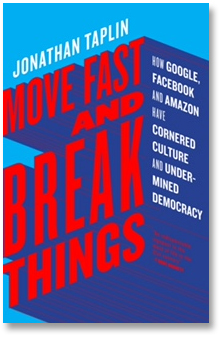Move Fast and Break Things, book review: Where did the internet go wrong?


Move Fast and Break Things: How Facebook, Google, and Amazon have cornered culture and what it means for all of us • By Jonathan Taplin • Macmillan • 308 pages • ISBN: 978-1-5098-4769-3 • £18.99
The inconvenient truth about having a quarter of a century experience online is that you can remember the ideals with which the pioneers started: share information, spread democracy, empower people. And then you compare that to the world according to GAFA (Google-Apple-Facebook-Amazon) and wonder where it all went wrong.
Answering this question -- without, it appears, much personal memory of the early internet -- is Jonathan Taplin's focus in Move Fast and Break Things: How Facebook, Google, and Amazon have cornered culture and what it means for all of us. His central complaint: these monopsony companies are putting artists out of business. And they're surveilling us all in the process. Why can't we re-decentralize the internet?
Taplin's claim to authority rests on his past as a producer: concerts for Bob Dylan and The Band, movies for Martin Scorsese, and documentaries for TV. After all that, he served as the director of the Annenberg Innovation Lab at the University of Southern California. In 1996, he writes, he founded the first video-on-demand service, Intertainer, which was successful until the major studies stopped licensing their movies; later, it won an anti-trust suit that was settled in 2006 and today claims Microsoft, Thomson, Comcast, and Apple license its patents.
Taplin paints this is a success for the system the internet is breaking down. But is it? In the interests of blaming the internet, Taplin glosses over the enormous consolidation in the entertainment industry that took place in the 1970s and 1980s and the debt-loading and acquisitions that came with it. Someone viewing the story with a slightly different lens might say that while Intertainer's anti-trust claims were entirely justified, the answer is not to change the internet to give the companies that first supported and then killed it greater power. Taplin's own view is nostalgic: in the recording industry of 1967, he writes, "everyone got paid". Everyone who was successful in that system, yes.
Half right
Taplin is half right about a lot of things. The internet is indeed vastly more centralised than it was, and in the US a crucial part of this is that in most places there are at most two consumer broadband providers. Data surveillance is a giant problem. So is fake news -- yet GAFA only control part of it. The ask-permission-not-forgiveness culture of Silicon Valley does indeed "move fast and break things": Uber, Google Books, and so on. But in writing about online piracy he picks as his Exhibit A Kim Dotcom and MegaUpload with a side order of Napster and a buffet of YouTube -- yet never mentions torrents or The Pirate Bay. Is torrenting the kind of decentralization he wants?
Niggling errors abound. Taplin thinks the right to be forgotten requires the deletion only of false stories. He collapses Amazon's various steps throughout the 1990s into a single business plan. He quotes industry-sourced dropping revenue figures after 2000 and assumes "the internet" must be the reason. He recounts the founding of Facebook from The Social Network without correcting its factual errors. He depicts Burning Man as an example of an unregulated and privately owned polity when the reality is that hundreds of volunteers close out the event's contract each year by combing the desert sand to ensure no traces are left behind. He also has little taste for nuance, seemingly confusing EFF's critique of legislation with defending revenge porn site owners and GAFA's business models and data practices with "the internet". Finally, he dismisses "the copyleft" as Google allies.
The most interesting parts of the book are the history of the rising influence of libertarianism, connecting George Gilder, Sean Parker (Napster founder and early Facebook investor), the Koch brothers, and Peter Thiel. Yet just as media consolidation pre-dates the internet, so tax evasion is a worldwide corporate phenomenon. How many ills can you blame on a handful of Silicon Valley libertarians?
Read more book reviews